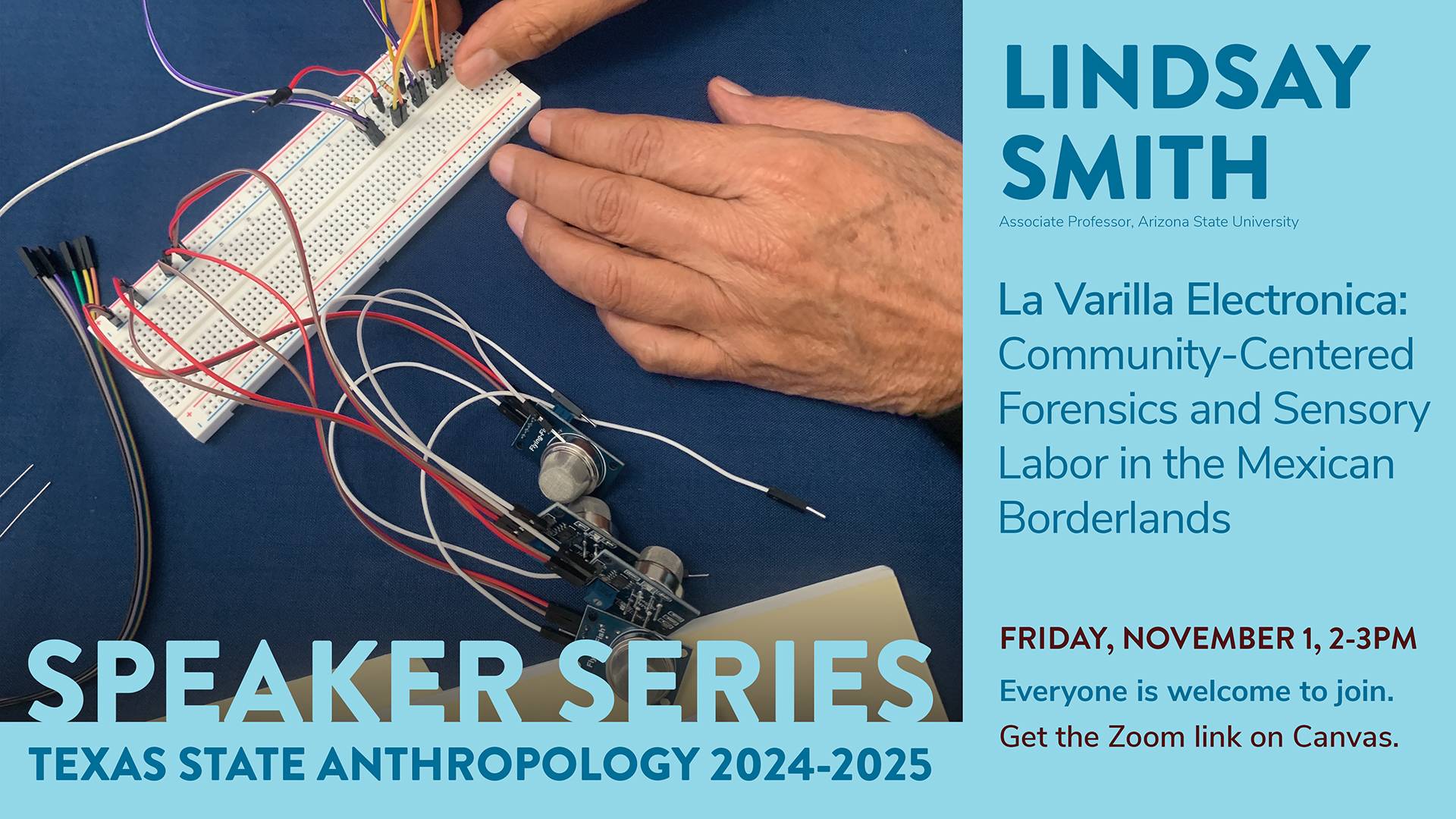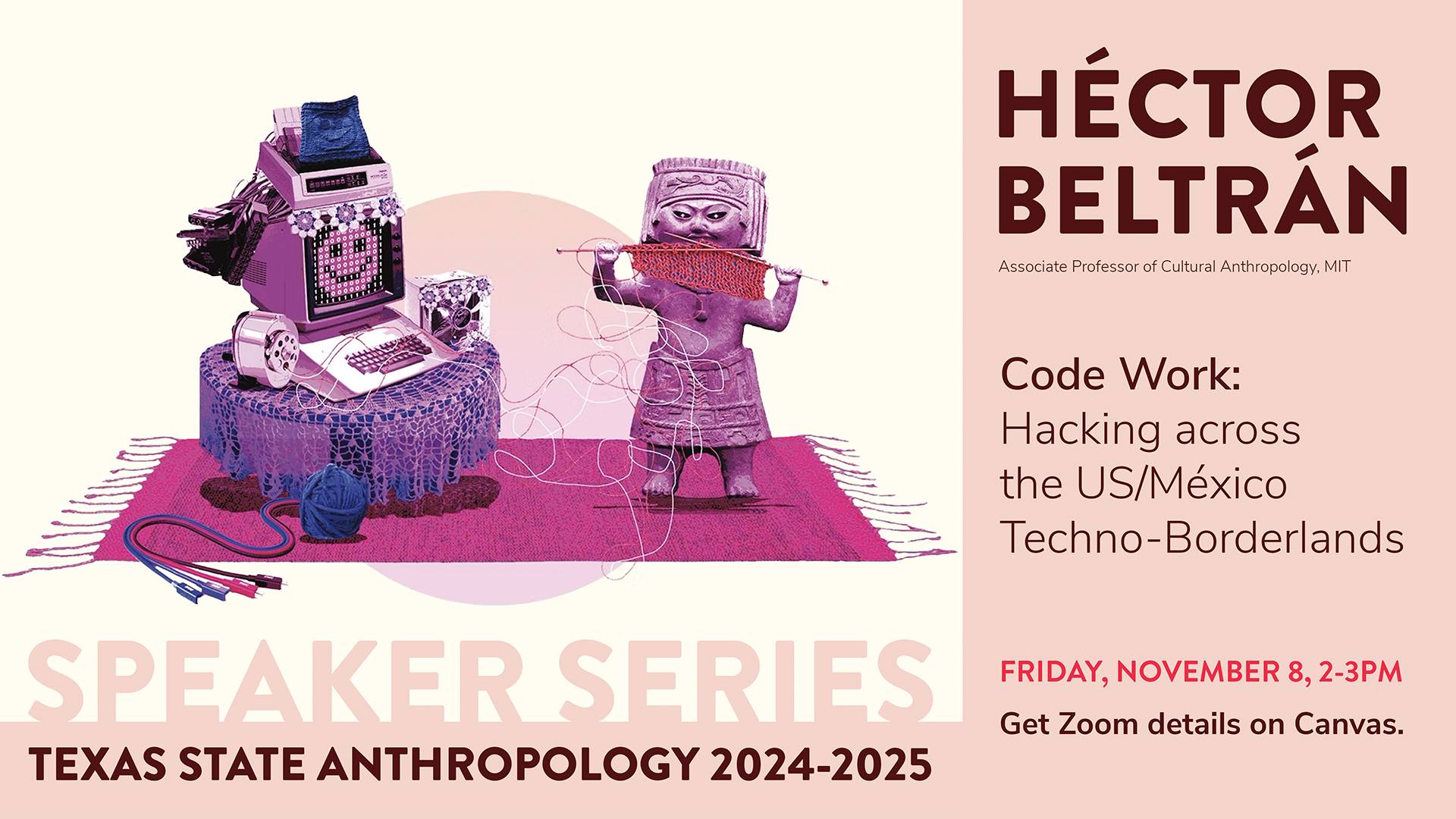Anthropology Department Speakers Series | 2024

La Varilla Electronica: Community-centered forensics and sensory labor in the Mexican Borderlands.
Lindsay Smith
Associate Professor
School for the Future of Innovation in Society
Arizona State University
November 1, 2-3PM
Zoom details on Canvas.
Smith is an assistant professor in the School for the Future of Innovation in Society. She studies the role of new technological innovations in post-conflict settings and has worked with families, scientists, and activist groups in Argentina, Guatemala, and Peru to document how citizens and scientists have drawn on DNA as a tool for justice after genocide. In her current work, Dr. Smith focuses on migration from Central America to the United States to help document the violence and disappearance that migrants suffer in Mexico and the US-borderlands. At the core of her writing, research and teaching lies the question of how and when new technologies can be used to address human suffering caused by violence and dispossession. The recipient of fellowships from the Mellon Foundation, the Wenner-Gren Foundation, and Northwestern University, as well as grants from the National Science Foundation and National Institutes of Health, she has published articles in key journals in the social studies of science and is currently completing her book, “Subversive Genes: Making DNA and Human Rights in Argentina.
Abstract:
In this talk I examine the co-design of "La Varilla Electrónica," an open-source, community-designed technology that uses chemical sensors to aid family searchers looking for clandestine graves across Mexico. Based on a long-term collaboration with Buscadoras Mexico, including interviews with searchers, workshop data, and design and assembly guides, we show how the embodied experience of searchers, their intimacy with the physical and emotional dimensions of their work, and their strategic use of searching as a tool of political critique, shape design choices. The device, thus, incorporates a deep engagement with the sensory, affective, and communal aspects of searching. I show how these acts of incorporation, performance, and speculation, alongside traditional function-focused technology development, have the potential to foster human rights technologies capable of interrupting colonialist foundations of hegemonic science and innovation, even if ephemerally and partially.

Code Work: Hacking across the US/México Techno-Borderlands
Héctor Beltrán
Class of 1957 Career Development Associate Professor
Department of Anthropology
Massachusetts Institute of Technology (MIT)
November 8, 2-3PM
Zoom details on Canvas.
Héctor Beltrán is a sociocultural anthropologist who draws upon his interdisciplinary background to study how the technical aspects of computing inform and are shaped by social structures and lived experiences of identity, race, ethnicity, class, and nation. Beltrán’s first book, Code Work: Hacking Across the US/México Techno-Borderlands (Princeton, 2023), examines how Mexican and Latinx coders navigate a transnational economy of tech work and, in the process, develop a strong sense of their personal and political selves.
Abstract:
In Code Work, Héctor Beltrán examines Mexican and Latinx coders’ personal strategies of self-making as they navigate a transnational economy of tech work. Beltrán shows how these hackers apply concepts from the code worlds to their lived experiences, deploying batches, loose coupling, iterative processing (looping), hacking, prototyping, and full-stack development in their daily social interactions—at home, in the workplace, on the dating scene, and in their understanding of the economy, culture, and geopolitics. Merging ethnographic analysis with systems thinking, he draws on his eight years of research in México and the United States—during which he participated in and observed hackathons, hacker schools, and tech entrepreneurship conferences—to unpack the conundrums faced by workers in a tech economy that stretches from villages in rural México to Silicon Valley.
Beltrán chronicles the tension between the transformative promise of hacking—the idea that coding will reconfigure the boundaries of race, ethnicity, class, and gender—and the reality of a neoliberal capitalist economy divided and structured by the US/México border. Young hackers, many of whom approach coding in a spirit of playfulness and exploration, are encouraged to appropriate the discourses of flexibility and self-management even as they remain outside formal employment. Beltrán explores the ways that “innovative culture” is seen as central in curing México’s social ills, showing that when innovation is linked to technological development, other kinds of development are neglected. Beltrán’s highly original, wide-ranging analysis uniquely connects technology studies, the anthropology of capitalism, and Latinx and Latin American studies.
